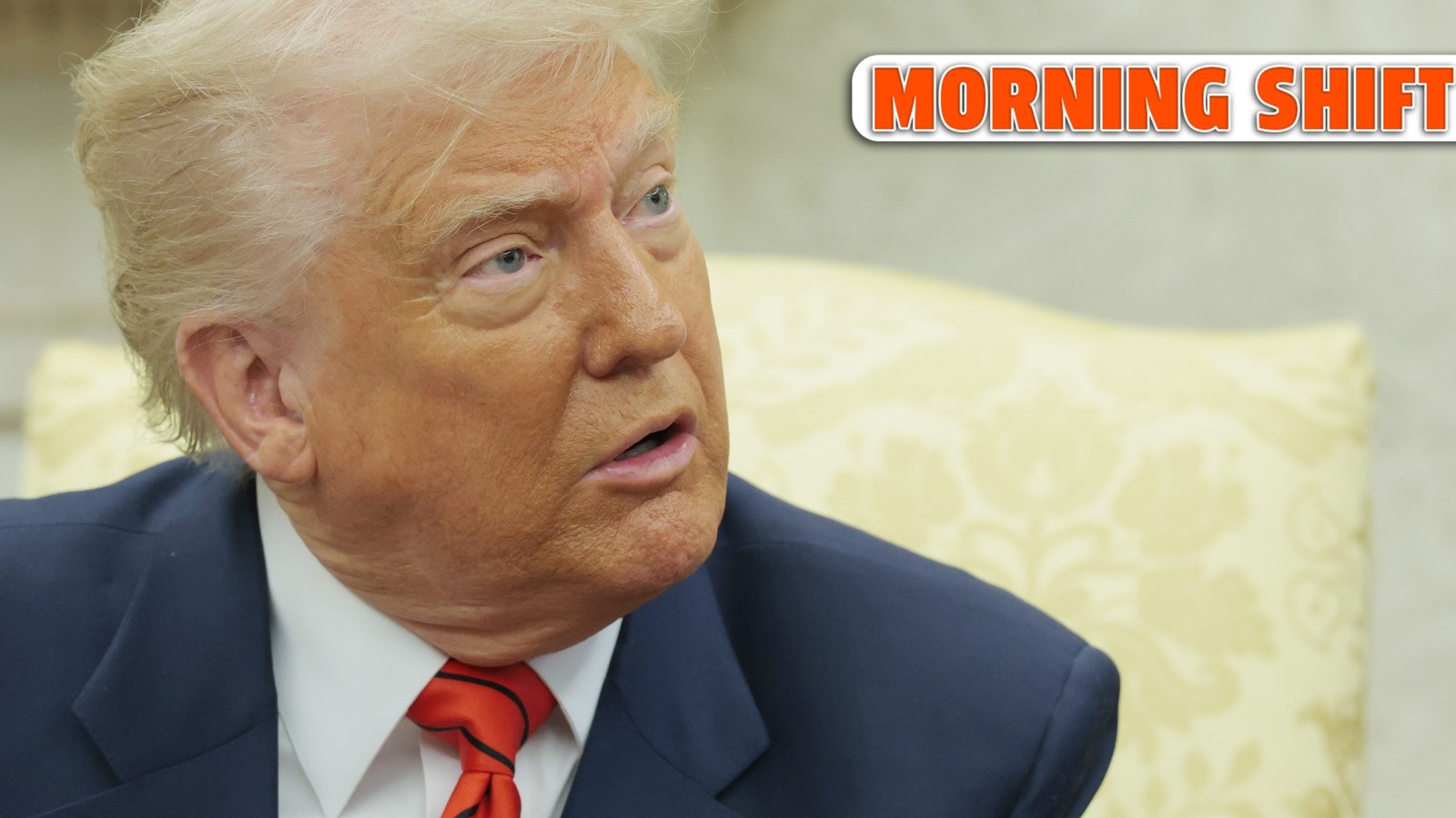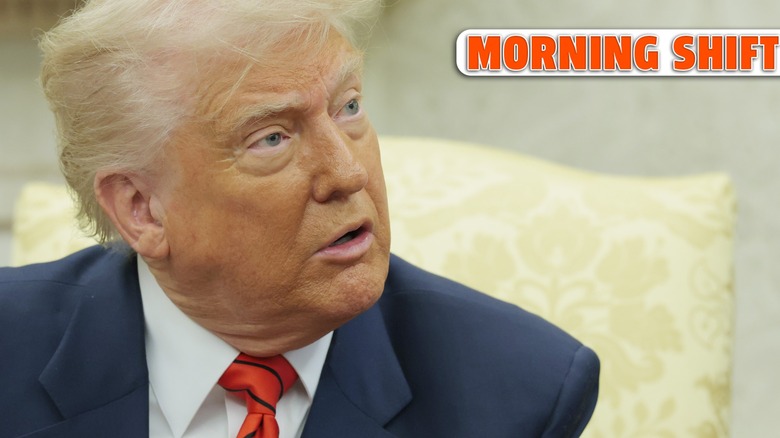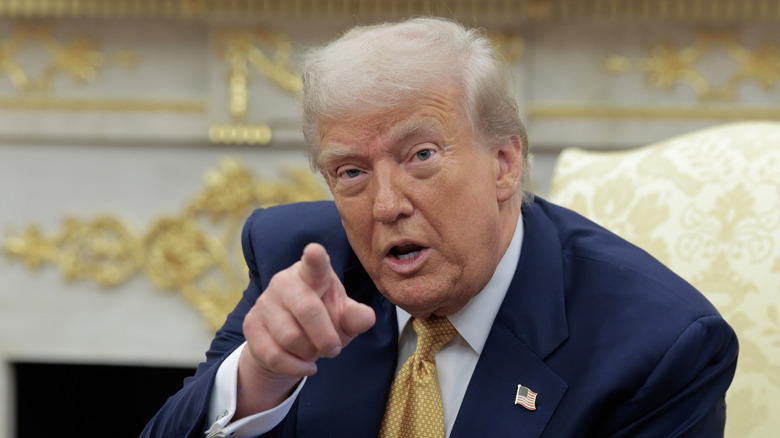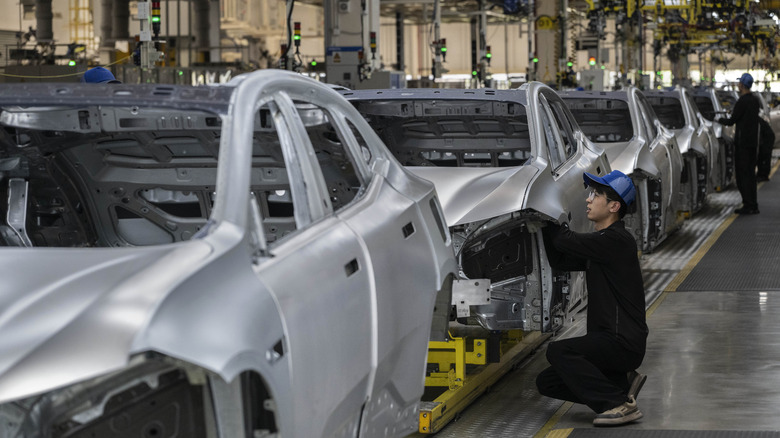Good morning! It’s Friday, August 8, 2025, and this is The Morning Shift, your daily roundup of the top automotive headlines from around the world, in one place. This is where you’ll find the most important stories that are shaping the way Americans drive and get around.
In this morning’s edition, we dive into just how much Trump’s tariffs have cost the auto industry and take a look at China’s slowing car sales. We’re also talking about Ford’s decision to delay some EVs until 2028 and CarGurus’ decision to wind down its CarOffer operation.
1st Gear Tariffs have erased billions from automakers’ books
Donald Trump’s tariffs have only been around for a few months at this point, and they’re already causing financial havoc throughout the automotive industry. New analysis shows that his duties have cost the sector nearly $12 billion so far. Here’s the rub, though: this is far from over, and automakers aren’t going to keep eating the bulk of these costs forever.
The only money-saving responses these companies have are to raise prices or bring production to the U.S. Neither of these are easy decisions to make, and the latter can take years if the company doesn’t have a huge footprint here already. From the Wall Street Journal:
White House trade policy may be accelerating an industry trend toward making cars closer to where they are sold. The big auto markets of North America, Europe and China are increasingly divided by different regulations, technologies and consumer preferences, encouraging automakers to design and manufacture locally.
[…]
The total hit from higher import duties reported by the big listed players now stands at $11.8 billion, according to a Wall Street Journal tally.
And the hits will keep coming: Toyota forecast tariffs will create a $9.5 billion burden through its fiscal year that ends next March, leading to an anticipated 44% decline in net profit.
For the world’s 10 largest automakers, not including those in China, net profit is currently forecast to fall by roughly a quarter this calendar year to its lowest level since 2020, when the pandemic led to cash-draining factory shutdowns.
Right now, it seems like most automakers are in a bit of a holding pattern — not wanting to make a wrong move and get yelled at by Trump. I get that, but it’s only going to end up hurting consumers. After all, they’re the least important part of this whole puzzle.
I’m really not too sure how this all ends, but I’m fairly confident that whatever the result is, we are going to be the ones who are getting screwed. You cannot expect automakers to eat this money forever or just pick up and move factory operations to the U.S. in the blink of an eye. Has someone tried telling Trump that?
2nd Gear: China’s red-hot car market is cooling
China’s pledge to end its automotive industry’s aggressive price war seems to be a double-edged sword. On one hand, fewer models were discounted in July; however, on the other hand, the move is clearly hurting sales. The Passenger Car Association says that 17 vehicles for sale in China had price cuts. That’s down from 23 vehicles with price cuts in July of 2023 and 2024.
Since car prices aren’t being artificially deflated, overall vehicle sales fell to 1.8 million units in July — a 12% drop from the previous month. A slightly dim bright spot is the fact that sales were up 6.3% year-over-year in July. That sounds like pretty good news until you consider the fact that they’d been up about 15% every month since March. From Bloomberg:
China has intensified scrutiny of its auto sector on concerns the extended price war that’s plagued the industry is unsustainable and risks sending weaker firms into bankruptcy. Officials summoned the heads of major electric vehicle makers, including BYD Co., to Beijing in early June, where they were told to self-regulate and instructed to not offer unreasonable discounts.
Beyond the carmakers, authorities have also cracked down on commissions for dealers who get customers to sign up to auto loans offered by a partnering bank — a tactic that exacerbated the price war as dealers often used part of the kick-back to cut prices. That change also contributed to the slowdown in sales in July, the association said.
It’s not all bad news for the industry, though. Some analysts believe that sales for 2025 will still grow overall despite the fact that there are fewer deals to be had. Some of this could be due to the idea that buyers will rush to get into a car before a 10% exemption on vehicle purchasing tax is cut to 5% starting next year. We shall see.
None of this is terribly unexpected. There was no way these companies were going to go on forever offering their vehicles at unbelievable discounts. That’s not really a winning business plan. Still, it was nice for buyers who were able to take advantage of the situation.
3rd Gear: Electric Ford pickup, van pushed to 2028
If you were looking forward to a second electric Ford truck or van, you’re going to have to keep waiting. The company just delayed two of its next-generation electric vehicles to make room for smaller, more affordable offerings. Basically, Ford is saying we’re all broke, so it needs to cater to us a bit more.
The low-cost EV platform is designed to underpin a bunch of smaller cars, starting with a small pickup truck in 2027. It is Ford, after all. To be fair, Ford already has the F-150 Lightning and E-Transit available to satiate consumers, but those are hardly purpose-built EVs. From Automotive News:
The automaker in recent months told suppliers that a full-size electric pickup set for its BlueOval City assembly plant in Tennessee has been delayed to 2028 from 2027, according to three people familiar with the plans. Separately, an electric van — expected to be a next-generation E-Transit — slated for 2026 production in Avon Lake, Ohio, also is delayed until 2028, the sources said.
Both vehicles already have been pushed back before. The van, first announced in 2022, originally was expected “mid-decade,” while the pickup, known internally as “T3,” initially had been promised by this year.
“F-150 Lightning, America’s best-selling electric truck, and E-Transit continue to meet today’s customer needs,” a Ford spokesperson said in a statement. “We remain focused on delivering our Ford+ plan and will be nimble in adjusting our product launch timing to meet market needs and customer demand while targeting improved profitability.”
This isn’t the first time Ford has changed its EV strategy. Last year, it canceled a pair of three-row electric crossovers, deciding to use the factory space they would have taekn up to build Super Duty trucks. Never chage, Ford.
The T3 is meant to be a replacement for the F-150 Liughtning, and it’ll be a centerpiece of Ford’s $5.6 billion investment that CEO Jim Farley has called a “seminal moment” for the company.
4th Gear: Say goodbye to CarOffer
Welp, that didn’t last long. After two short years, CarGurus announced it is shutting down operations of its wholesale digital marketplace, called CarOffer, after fully acquiring the company in 2021. The company’s CEO said it assessed strategic alternatives for CarOffer, but there was nowhere to go with it with thanks to the state of the current market. Damn. RIP. From Automotive News:
“It has struggled in today’s more volatile and unpredictable pricing environment where dealers require more flexibility and broader automation to streamline fulfillment,” [CEO Jason] Trevisan said during the company’s second-quarter earnings call Aug. 7.
He said that the company will still use technology, analytics and insights CarOffer developed.
“Going forward, while we will no longer operate the CarOffer transactions business, we will retain and build on the underlying technology we created for it, capabilities that we believe remain central to CarGuru’s sourcing strategy,” Trevisan said.
Right now, the plan is to wind down CarOffer through the rest of 2025. It’s expected to cost somewhere between $14 and $19 million. $5 to $7 million of that will come from one-time restructuring costs and “contract ermination charges.”
This is a very unseremonious end to CarGurus’ venture. The company paid $140 million in cash and stock for 51% of the company in 2021. The company completed its acquisition of the remaining 49% in November of 2023, paying $75 million in cash. Unfortunately, all of that was for nothing. Bummer.
Reverse: Nice going, Ron.
It’s sort of fun how you can look at the problems of today’s world and trace a direct line back to the Reagan administration. If you want to learn more about The Gippers dumbass decision to lay off thousands of striking air-traffic controllers, head over to History.com.
On the radio: Lil Wayne – Right Above It feat. Drake
This song is 15 years old at this point, but it still goes incredibly hard. If you want to start the last day of the work week off the right way, look no further.








